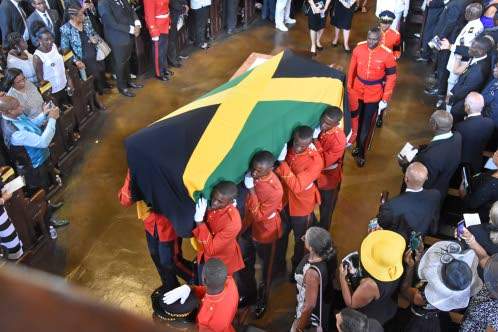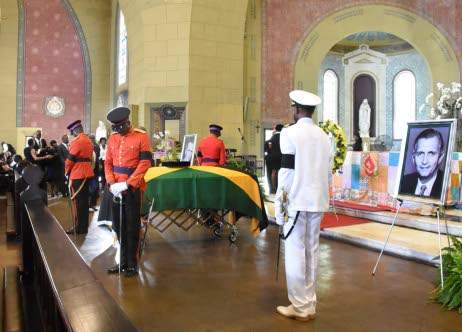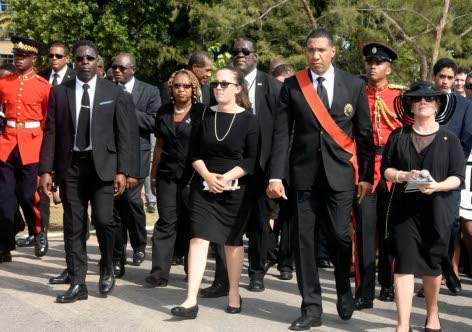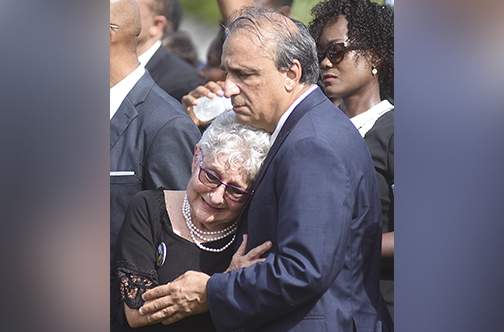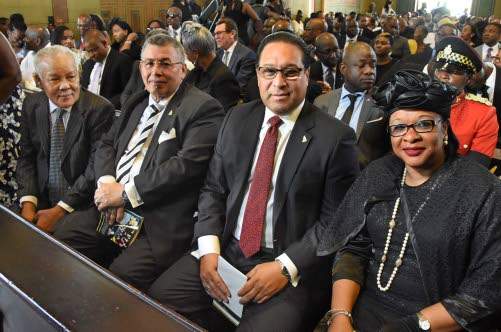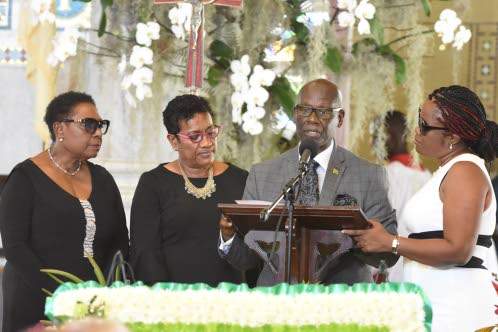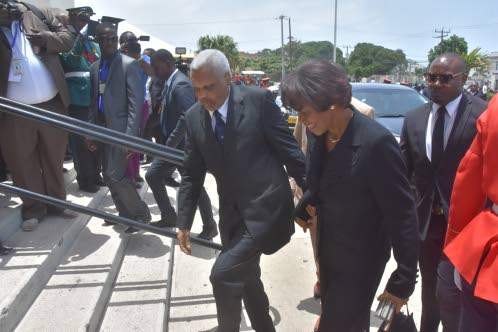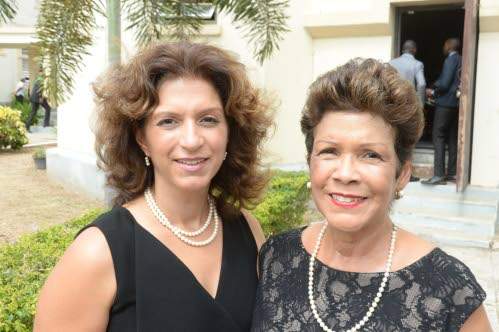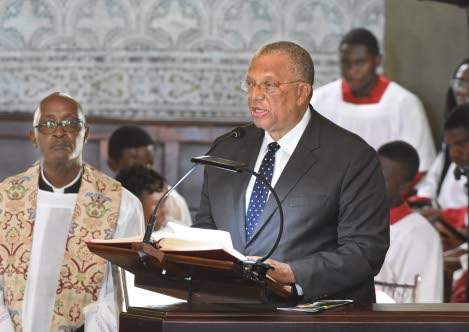(Jamaica Observer) Jamaicans from all walks of life filled the streets around the Cathedral of the Most Holy Trinity in Kingston yesterday, watching and cheering as the carriage bearing the coffin with the remains of former Prime Minister Edward “Papa Eddie” Seaga made its way slowly to its final resting place at National Heroes’ Park.
A bright, cloudless, sun-baked Sunday was the scenery for the State funeral, as the huge crowd gulped down hundreds of litres of bottled water served by waiters all around the century-old church which has been recognised globally for its 85-foot-high copper-covered dome.
A huge empty lot in front of the impressive building was transformed into a viewing area for people who could not be accommodated on the cathedral’s premises, much less inside the church.
Inside the church, Minister of Local Government and Community Development Desmond McKenzie — one of several youths rescued from the harsh living conditions of “Back-O-Wall” which Seaga eventually restored and renamed Tivoli Gardens, after an amusement park and pleasure garden in Copenhagen, Denmark — recalled his relationship with the man who fortuitously became Member of Parliament for Kingston Western in 1962 and ended up as Jamaica’s fifth prime minister in 1980 with their support.
“Edward Seaga was not only a public figure, he was the kind of man we were longing for in our lives in Western Kingston,” McKenzie told the congregation. He was flanked by three of the women who similarly owed their success to Seaga’s passion for the poor, including current Minister of Culture, Gender, Entertainment, and Sport Olivia “Babsy” Grange.
“We had many unforgettable experiences with him. The first time that many of us had milkshake and hamburger came from one of the many trips that ‘Papa Eddie’ took us on to Monty’s on Old Hope Road,” McKenzie recalled.
However, he said that even more important was the value of hard and proper work, and a strong sense of duty to others, which Seaga instilled in them.
A most passionate statement came from visiting Prime Minister of Grenada Dr Keith Mitchell, who heaped praises on Seaga’s involvement in Grenada during the military intervention in his country in 1983.
“I feel, therefore, a profound sense of loss as we gather here today for the funeral of our late brother; a personal friend, a friend of the [ruling] New National Party, and a friend of Grenada,” Mitchell said.
He noted that while Seaga’s entire life’s work may have labelled him a Jamaican, for many elsewhere in the region “Eddie was a Caribbean man, a champion of Caribbean regional integration movement, and one who advocated for change to improve the process to unite us all,” Dr Mitchell said.
“Sisters and brothers, my presence here today is not only as a regional head of state saying farewell to a dearly beloved brother, but I stand here as a Grenadian who is grateful for the bold, decisive actions of the late Edward Seaga in 1983 when my country was reeling from the effects of a political crisis. In that historical period, Eddie demonstrated what it was to be your brother’s keeper.
“And as I stand here today to bid farewell to this courageous brother, I also say a final thank you to my friend: Thank you for the courage you displayed by supporting the intervention, invasion, whatever you want to call it, in Grenada in 1983. There may not have been unanimous support for the course of action taken then, but I stand here today convinced that you were acting in Grenada’s best interest, and for that, we thank you,” Mitchell said in his tribute.
Former Prime Minister PJ Patterson, who won three consecutive general elections against Seaga and the Jamaica Labour Party (JLP) between 1983 and 2002, urged the congregation to join him in “singing the praises of a famous man of our generation”.
“Our views did not always coincide on a vast range of national issues and external policies, but that consideration and that habit of division will not prevent me from paying my humble tribute to a titanic warrior,” Patterson said.
In his tribute, Prime Minister Andrew Holness recalled his recruitment from the campus of The University of the West Indies by Seaga, and how he found the former JLP leader quite different from the image that had been painted of him.
“I feel privileged to be standing here today, and I am still in awe as I was the first day I met him,” Holness stated.
Suffragan Bishop of Kingston Robert Thompson, in his homily, said that what could not be ignored was the important role that religion and culture played in Seaga’s life.
He said that, given the tumult in Jamaican politics between the mid-1960s and continuing for the next three decades, it is easy to forget the scholarly and pioneering contributions which Seaga made to national life.
He said that he would leave others to judge whether Seaga succeeded in weaving a religious and social synthesis that contributed to the common life of the Jamaican people.
“Seaga remained an Anglican to his death, but recognised the critical role which Revivalism and folk culture played in shaping the world view of the Jamaican people during and long after slavery. That he believed is the undisputed fact of our history and must be accounted for, despite whatever resistance came from the social elite.
“Without this affirmation, the majority of Jamaicans are not likely to believe that they belong to anything, and where you do not belong you are not likely to feel like an equal partner, and therefore not likely to make sacrifices for the collective good,” Thompson said.
Governor General Sir Patrick Allen read the first lesson from Isaiah 61 verses 1-4; Opposition Leader Dr Peter Phillips read the second lesson from Revelation 21, verses 1-7; and the prayer of the faithful was led by Bishop Christine Gooden-Benguche of the Methodist Church in Jamaica.
The officiating clergy included: the Roman Catholic archbishop of Kingston, the Most Rev Kenneth Richards; the Most Rev Howard Gregory, archbishop of the West Indies; Father Kingsley Asphall, rector of the cathedral; Bishop Herro Blair of the Deliverance Evangelistic Association; Pastor Everett Brown, president of the Jamaica Union Conference of Seventh-day Adventists; Bishop Anthony Cousins of the Afro Christian Revival Church; Rev Peter Garth, president of the Jamaica Evangelical Union; Sheik Musa Tijani, leader of the Islamic Council of Jamaica; Dr Patricia Holness, president of the Jamaica Pentecostal Union; and Israel Pinchas, president of the United Congregation of Israelites.
